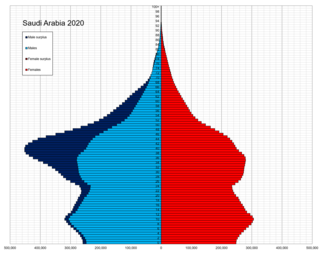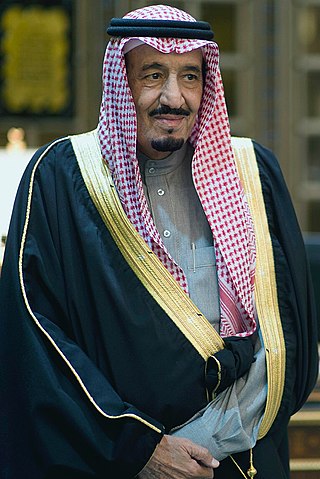
The history of Saudi Arabia as a nation state began with the emergence of the Al Saud dynasty in central Arabia in 1727 and the subsequent establishment of the Emirate of Diriyah. Pre-Islamic Arabia, the territory that constitutes modern Saudi Arabia, was the site of several ancient cultures and civilizations; the prehistory of Saudi Arabia shows some of the earliest traces of human activity in the world.

Saudi Arabia is the fourth largest state in the Arab world, with a reported population of 32,175,224 as of 2022. 41.6% of inhabitants are immigrants. Saudi Arabia has experienced a population explosion in the last 40 years, and continues to grow at a rate of 1.62% per year.

The politics of Saudi Arabia takes place in the context of a unitary absolute monarchy, along traditional Islamic lines, where the King is both the head of state and government. Decisions are, to a large extent, made on the basis of consultation among the King, the Council of Ministers, Islamic scholars, tribal leaders and other traditional elites of the society. While some critics and Western columnists have accused the Saudi government of being totalitarian, several political scientists have regarded it as lacking features of totalitarianism, instead classifying it as an authoritarian state.

The Arabian Peninsula, or Arabia, is a peninsula in West Asia, situated northeast of Africa on the Arabian Plate. At 3,237,500 km2 (1,250,000 sq mi), the Arabian Peninsula is the largest peninsula in the world.

Saudi Arabia, officially the Kingdom of Saudi Arabia (KSA), is a country in West Asia. It covers the bulk of the Arabian Peninsula and has a land area of about 2150000 km2, making it the fifth-largest country in Asia and the largest in the Middle East. It is bordered by the Red Sea to the west; Jordan, Iraq, and Kuwait to the north; the Persian Gulf, Qatar and the United Arab Emirates to the east; Oman to the southeast; and Yemen to the south. Bahrain is an island country off its east coast. The Gulf of Aqaba in the northwest separates Saudi Arabia from Egypt and Israel. Saudi Arabia is the only country with a coastline along both the Red Sea and the Persian Gulf, and most of its terrain consists of arid desert, lowland, steppe, and mountains. Saudi Arabia's capital and largest city is Riyadh; the kingdom is also the location of Islam's two holiest cities of Mecca and Medina.

The House of Saud is the ruling royal family of Saudi Arabia. It is composed of the descendants of Muhammad bin Saud, founder of the Emirate of Diriyah, known as the First Saudi state (1727–1818), and his brothers, though the ruling faction of the family is primarily led by the descendants of Abdulaziz bin Abdul Rahman, the modern founder of Saudi Arabia. It forms a subtribe of the larger prominent ancient Banu Hanifa tribe of Arabia, of which well known 7th century Arabian theologist Maslama ibn Ḥabīb originates. The most influential position of the royal family is the King of Saudi Arabia, an absolute monarch. The family in total is estimated to comprise 10,000 to 20,000 members; however, the majority of power, influence and wealth is possessed by a group of about 2,000 of them. Some estimates of the royal family's wealth measure their net worth at anywhere from as low as $500 billion to as high as $3 trillion. This figure includes the market capitalization of Saudi Aramco, the state oil and gas company, and its vast assets in fossil fuel reserves, making them the wealthiest family in the world and the wealthiest in recorded history.

The cultural setting of Saudi Arabia is greatly influenced by the Arab and Islamic culture. The society is in general deeply religious, conservative, traditional, and family-oriented. Many attitudes and traditions are centuries-old, derived from Arab civilization and Islamic heritage. However, its culture has also been affected by rapid change, as the country was transformed from an impoverished nomadic society into a rich commodity producer in just a few years in the 1970s. This change has also been affected by and the result of a number of factors including the communications revolution and external scholarships. The most recent ruler or king of Saudi is King Salman of Saudi Arabia.

Salman bin Abdulaziz Al Saud is King of Saudi Arabia, reigning since 2015 and had previously served as Prime Minister of Saudi Arabia from 2015 to 2022. The 25th son of King Abdulaziz, the founder of Saudi Arabia, he assumed the throne on 23 January 2015. Prior to his accession, he was Crown Prince of Saudi Arabia from 18 June 2012 to 23 January 2015. Salman is the third oldest living head of state and the oldest living monarch besides being the country's first head of state born after the unification of Saudi Arabia. He has a reported personal wealth of at least $18 billion, which makes him the third wealthiest royal in the world and one of the wealthiest individuals in the world.

Center pivot irrigation in Saudi Arabia is typical of many isolated irrigation projects scattered throughout the arid and hyper-arid regions of the Earth. Nonrenewable fossil water is mined from depths as great as 1 km (3,000 ft), pumped to the surface, and distributed via large center pivot irrigation feeds. The circles of green irrigated vegetation may comprise a variety of agricultural commodities from alfalfa to wheat. Diameters of the normally circular fields range from a few hundred meters to as much as 3 km (1.9 mi).
Badr bin Abdulaziz Al Saud was a long-term deputy commander of the Saudi National Guard and a senior member of the Saudi royal family.

The Prime Minister of Saudi Arabia is the chairman of the Council of Ministers and head of government of the Kingdom of Saudi Arabia. The Prime Minister is always either the King of Saudi Arabia or Crown Prince of Saudi Arabia. Prince Mohammed bin Salman has been Prime Minister since 27 September 2022.

Saadanius is a genus of fossil primates dating to the Oligocene that is closely related to the common ancestor of the Old World monkeys and apes, collectively known as catarrhines. It is represented by a single species, Saadanius hijazensis, which is known only from a single partial skull tentatively dated between 29 and 28 million years ago. It was discovered in 2009 in western Saudi Arabia near Mecca and was first described in 2010 after comparison with both living and fossil catarrhines.

The king of Saudi Arabia, officially the king of the Kingdom of Saudi Arabia, is the monarch and head of state/head of government of the Kingdom of Saudi Arabia who holds absolute power. He is the head of the Saudi Arabian royal family, the House of Saud. The king is the supreme commander-in-chief of the Royal Saudi Armed Forces and the head of the Saudi national honors system. The king is called the "Custodian of the Two Holy Mosques", a title that signifies Saudi Arabia's jurisdiction over the mosques of Masjid al-Haram in Mecca and Al-Masjid an-Nabawi in Medina. The title has been used many times through the history of Islam. The first Saudi king to use the title was Faisal; however, King Khalid did not use the title after him. In 1986, King Fahd replaced "His Majesty" with the title of Custodian of the Two Holy Mosques, and it has been since used by both King Abdullah and King Salman. The king has been named the most powerful and influential Muslim and Arab leader in the world according to the Muslim 500.

Visitors to Saudi Arabia must obtain a visa unless they come from one of the visa exempt countries. Some visitors are eligible to obtain a visa online or on arrival while others needs to apply at one of the Saudi diplomatic missions in advance.
Saudi Arabia is a theocracy organized according to the principles of Islam, which puts emphasis on the importance of knowledge and education. In Islamic belief, obtaining knowledge is the only way to gain true understanding of life, and as such, both men and women are encouraged to study. Saudi Arabia is one of the G20 Economies and has a $1 Trillion GDP. In 2016, it launched one of the most significant programs globally - Vision 2030. In 2021, women's college graduation rates exceeded those of men's.

On 26 March 2015, Saudi Arabia, leading a coalition of nine countries from West Asia and North Africa, launched an intervention in Yemen following a request from Yemeni president Abdrabbuh Mansur Hadi for military support after his forces were ousted from Sanaʽa by Houthi insurgents during the Yemeni Civil War. Government forces, Houthi rebels, and other armed groups fought after the draft constitution and power-sharing arrangements collapsed, despite progress made by the UN during the political transition at that time. Violence escalated in mid-2014. Houthis and allied insurgents seized control of Sana'a in September 2014 and thereafter. In response, President Hadi asked Saudi Arabia to intervene against the Iranian-backed Houthis.
The desert-covered Kingdom of Saudi Arabia is the geographically largest country in the Middle East. Moreover, it accounts for 65% of the overall population of the GCC countries and 42% of its GDP. Saudi Arabia does not have a strong history in environmentalism. Thus, as the number of population increases and the industrial activity grows, environmental issues pose a real challenge to the country.
The geology of Saudi Arabia includes Precambrian igneous and metamorphic basement rocks, exposed across much of the country. Thick sedimentary sequences from the Phanerozoic dominate much of the country's surface and host oil.

Slavery existed in the area of later Saudi Arabia from antiquity until the 1960s.

Pygurus is a genus of sea urchins belonging to the family Clypeidae.














